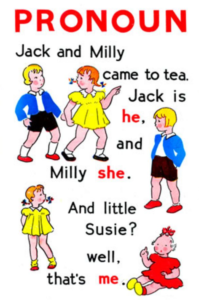 I signed up for Blinkist, which is a service that reduces books down to about 15-20 minutes of audio. It’s a nice service, and I like it so far.
I signed up for Blinkist, which is a service that reduces books down to about 15-20 minutes of audio. It’s a nice service, and I like it so far.
The most recent one I listened to alternated between he and she when referring to the unnamed “someone.”
It was annoying as Hell. Every time they said “she,” it was like my brain paused and did a quick check. “Who are they talking about now? Who is this ‘she’?”
“He” means “a person; anyone.” When I hear “he” used in an indeterminate way, I realize it doesn’t necessarily mean a man. It just means a person.
Would it be better if there was some other pronoun for that purpose? Maybe. Ask a linguist. I don’t know or care. The point is that “he” is the indeterminate pronoun in English. “She” is not.
Whoever did this particular Blink probably thought they were being oh so inclusive and tolerant by switching back and forth between he and she. But that’s comical. There are 45 (and counting) other pronouns they’d have to use to be properly “inclusive,” and imagine how annoying that would be — switching between he, she, ze, ey, em, eir, per, ve, fae, etc.
Every time they did it, my brain would have to pause and think, “Okay, who is the person who goes by ‘ve’ again? Oh, damn! They’re just trying to be woke.” It would completely disrupt the experience.
Which is entirely not the point of an indeterminate pronoun. It’s supposed to give your mind a break. “I’m just talking about someone — anyone. Don’t worry about figuring out who it is. It doesn’t matter. When it matters, I’ll tell you.”
This “my pronoun” business throws all that on its head. You have to constantly think about the “gender identity” of the person under discussion. Which is the agenda of the people who are pushing it — to retrain our brains to be constantly thinking about what “gender” someone identifies with at the moment. It’s torture, plain and simple.
But that’s getting slightly off the topic, which is the indeterminate pronoun.
Which is he. Get over it.
According to Pew Research…roughly over half of Americans (52%) say they would be somewhat or very comfortable using a gender-neutral pronoun to refer to someone.
https://www.pewresearch.org/fact-tank/2019/09/05/gender-neutral-pronouns/
That said, you are entitled to your preference. Yet, if this trend continues…it could it be you (and others who share your preference) that eventually have to…get over it.
That’s interesting, but probably not to the point. Using a gender neutral pronoun to refer “to someone” sounds like you’re speaking about a particular person. What’s in view in my post is not referring to a particular person, but to a non-particular person.
Of course people might eventually decide to use “ze” as the indeterminate pronoun.